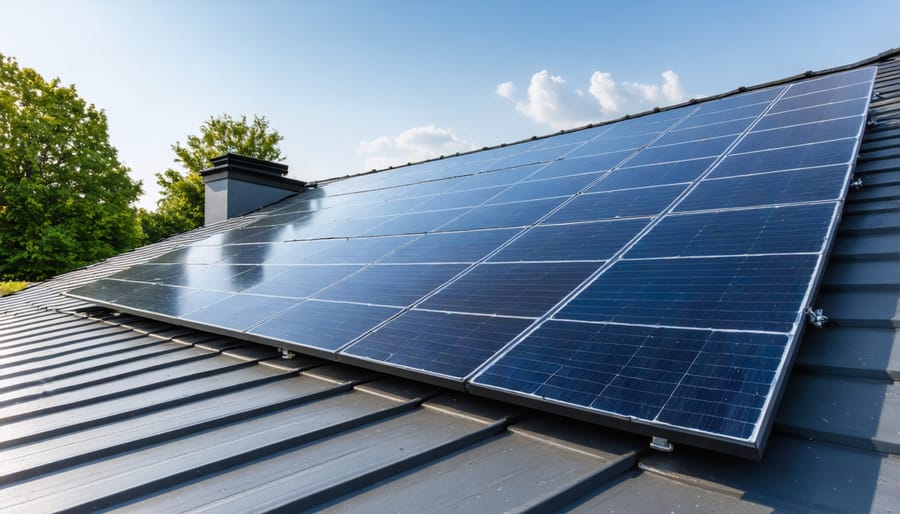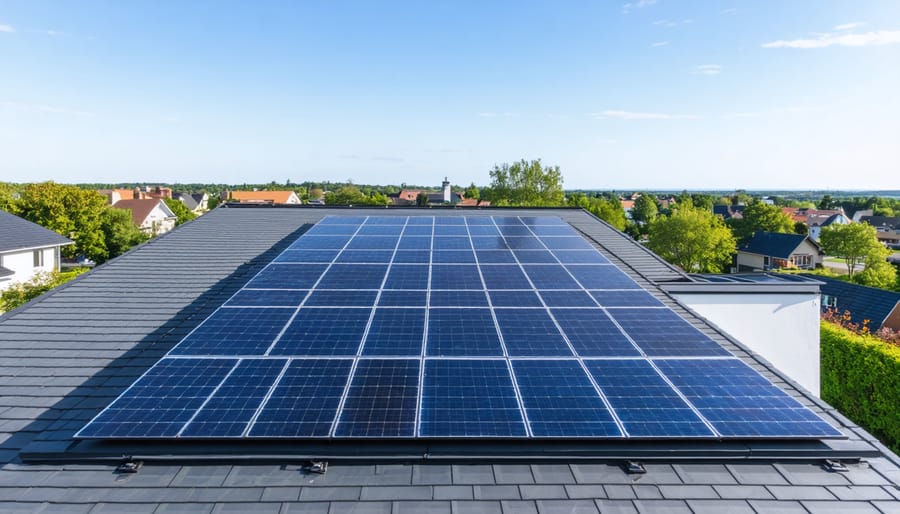Unlock substantial property tax savings and boost your home’s value through British Columbia’s solar panel property tax exemption program. Homeowners who install qualifying solar energy systems can exempt up to 100% of the added property value from their annual tax assessment, potentially saving thousands of dollars each year while contributing to a more sustainable future. This innovative tax incentive, combined with BC’s growing commitment to renewable energy, makes solar panel installation more financially attractive than ever before.
Recent data shows BC homeowners with solar installations save an average of $800-1,200 annually through combined energy cost reductions and property tax benefits. The exemption program, designed to accelerate the province’s transition to clean energy, represents a significant opportunity for property owners to invest in sustainable technology while securing long-term financial advantages.
Learn how this tax exemption, paired with BC’s solar rebates and incentives, can transform your property investment into a powerful driver of both environmental and economic value.

Understanding Solar Panel Property Tax Exemptions in BC
How the Exemption Works
To qualify for the solar panel property tax exemption in BC, your property must have an operational solar energy system installed. This includes both photovoltaic (PV) panels for electricity generation and solar thermal systems for water heating. The exemption applies to the added value that solar installations bring to your property, not the entire property tax assessment.
The application process is straightforward. First, contact your local tax assessor’s office to obtain the necessary forms. You’ll need to provide documentation of your solar installation, including proof of purchase, installation permits, and certification of system completion. Most municipalities require annual renewal of the exemption, typically with a simple form submission confirming the system remains operational.
For systems installed after January 1st, the exemption takes effect in the following tax year. For example, if you install solar panels in June 2024, your exemption would begin in the 2025 tax year. Remember to submit your application at least 60 days before the tax assessment date to ensure processing time.
The exemption remains valid as long as the solar system is functioning and meets current safety standards. Regular maintenance and documentation of system performance can help ensure continued qualification.
Municipal Variations
Across British Columbia, municipalities have adopted varying approaches to solar panel property tax exemptions. In Victoria, property owners can enjoy a 100% exemption on the value added by solar installations, making it one of the most progressive cities in this regard. Vancouver offers similar benefits through its Green Buildings Policy, which includes solar installations as part of its sustainable building initiatives.
Smaller communities like Nelson and Revelstoke have introduced their own unique incentive programs. Nelson’s EcoSave program combines tax exemptions with energy assessment services, while Revelstoke offers graduated exemptions based on the system size and energy output.
Some municipalities have taken different approaches. Kelowna, for instance, incorporates solar incentives into its broader climate action strategy, offering partial exemptions alongside other green energy benefits. Meanwhile, Surrey’s Solar Now pilot program demonstrates how communities can pair tax exemptions with additional incentives like installation rebates and expedited permit processing.
Before installing solar panels, residents should check with their local municipal office, as policies and application procedures can vary significantly between jurisdictions.

Financial Benefits of Solar Tax Exemptions
Annual Tax Savings
Let’s explore how the solar panel property tax exemption can translate into real savings for BC homeowners. For a typical single-family home in Vancouver valued at $1.2 million with a $25,000 solar installation, the property tax exemption could result in annual savings of approximately $750-900, based on current municipal tax rates.
Consider this practical example: The Smith family in Victoria installed a 6kW solar system on their $800,000 home. Without the exemption, their property taxes would have increased by about $500 annually due to the added property value. Thanks to the exemption, they maintain their original property tax rate while benefiting from reduced energy bills and increased home value.
Commercial property owners often see even more substantial savings. A small business in Kelowna with a $50,000 solar installation on their $2 million commercial property can save approximately $1,500-2,000 annually through the exemption. When combined with other solar financing options and energy savings, the total financial benefit becomes even more attractive.
Keep in mind that actual savings vary depending on your property’s location, assessment value, and the size of your solar installation. Local municipalities may offer additional incentives, potentially increasing your overall savings. To calculate your specific savings, consult with your local tax assessor or solar installation professional.
Long-term Property Value Impact
Installing solar panels can significantly increase your home’s value, with recent studies showing an average premium of 4.1% in property value across British Columbia. For a typical Vancouver home valued at $1.2 million, this could translate to nearly $50,000 in added value.
The combination of property tax exemptions and increased home value creates a powerful financial advantage for homeowners. According to local real estate data, homes with solar installations typically sell 20% faster than those without, particularly in environmentally conscious communities like Victoria and Vancouver.
The long-term value proposition becomes even more attractive when considering the rising energy costs in BC. Properties with solar installations are increasingly viewed as premium listings, offering potential buyers significant energy cost savings and environmental benefits. Real estate professionals report that solar-equipped homes are particularly appealing to millennials and environmentally conscious buyers, who often prioritize sustainability features in their home-buying decisions.
Local success stories include the Cedar Hills community in Surrey, where homes with solar installations have experienced value increases of up to 6% compared to similar properties without solar panels. This trend is expected to continue as British Columbia moves towards its clean energy goals and more buyers prioritize sustainable housing options.

Real Estate Market Advantages
Buyer Appeal
Solar panel property tax exemptions significantly enhance a home’s appeal to potential buyers in today’s environmentally conscious real estate market. Properties with solar installations that qualify for tax exemptions often command higher resale values, as buyers recognize both the environmental benefits and long-term cost savings.
Recent market trends show that homes with solar installations and tax benefits sell up to 20% faster than conventional properties. Buyers are particularly attracted to the combination of reduced energy costs and lower property tax obligations, viewing these features as valuable long-term investments.
For example, a typical home in British Columbia with a solar installation qualifying for tax exemption can offer new owners annual savings of $1,200 to $1,800 through reduced energy bills and property tax savings. This attractive package of benefits makes solar-equipped homes stand out in property listings and often becomes a decisive factor in purchase decisions.
Real estate agents increasingly highlight these tax exemptions as key selling points, recognizing that modern buyers prioritize both environmental sustainability and financial advantages in their home-buying decisions.
Market Competition Edge
Properties with solar installations enjoy a significant competitive edge in British Columbia’s real estate market. Recent market analysis shows that homes with solar panels and tax exemptions typically sell 4.1% higher than comparable properties without solar features. This advantage is particularly notable in eco-conscious communities like Vancouver and Victoria.
Real estate agents report that solar-equipped properties attract more viewings and spend less time on the market. Buyers are increasingly prioritizing energy efficiency and sustainable features in their home searches, making solar installations a valuable selling point. The property tax exemption adds another layer of appeal, as potential buyers recognize the long-term savings opportunity.
For commercial properties, the competitive advantage is even more pronounced. Businesses operating in solar-equipped buildings can market themselves as environmentally responsible, attracting environmentally conscious customers and partners. The tax exemption also provides a compelling financial incentive that can help offset operational costs, making these properties more attractive to potential tenants and investors.
This market edge is expected to strengthen as energy costs rise and environmental awareness grows throughout British Columbia.
Steps to Maximize Your Property’s Value
To maximize your property’s value through solar panel tax exemptions, start by conducting a thorough solar assessment of your property. Contact certified local solar installers who can evaluate your roof’s orientation, shading, and structural integrity. This initial step ensures you’ll get the most benefit from your solar investment.
Next, research available solar energy grants in BC and combine them with property tax exemptions to enhance your financial benefits. Create a comprehensive financial plan that includes installation costs, expected energy savings, and potential increase in property value.
Consider these strategic improvements to boost your property’s value further:
1. Install a solar monitoring system to track energy production and showcase savings to potential buyers
2. Upgrade your electrical panel if needed to accommodate the solar installation
3. Document all maintenance records and warranty information
4. Obtain proper certification and permits for your installation
Remember to work with a qualified real estate appraiser who understands solar installations’ impact on property values. They can help you document the increased value for future property assessments and sales purposes.
When maintaining your system, schedule regular cleaning and inspections to ensure optimal performance. This demonstrates responsible ownership and helps maintain the system’s value-adding potential.
Finally, keep detailed records of your energy savings and reduced carbon footprint. These statistics can be powerful selling points when marketing your property, as more buyers are prioritizing sustainable features in their home-buying decisions.
By following these steps and maintaining proper documentation, you’ll not only maximize your tax benefits but also position your property as a premium, energy-efficient investment in the real estate market.
The solar panel property tax exemption in British Columbia represents a significant opportunity for property owners to embrace sustainable energy while enjoying substantial financial benefits. By installing solar panels, you not only contribute to environmental conservation but also protect yourself from rising energy costs while potentially increasing your property’s value – all without the burden of additional property taxes. The time to act is now, with various incentives and support programs available to help you make the transition to solar energy. Take the first step by contacting your local municipality or a qualified solar installer to learn more about how you can benefit from this tax exemption while building a more sustainable future for our community. Remember, every solar installation brings us closer to our collective goal of a cleaner, more energy-independent British Columbia.

